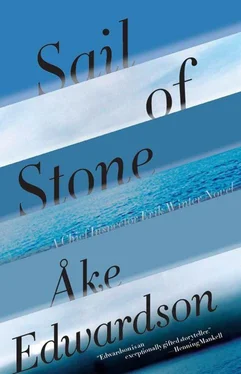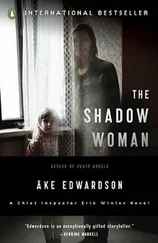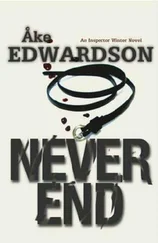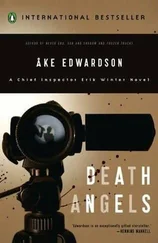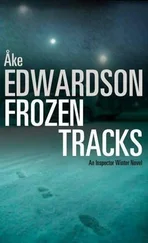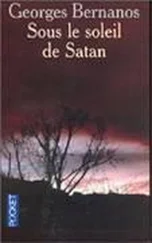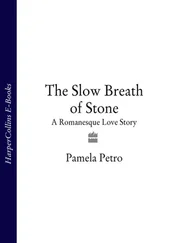“Scotland.”
“My dad wasn’t even a year old when he left,” she said. “The last time. It was in the autumn of 1939.”
Winter didn’t say anything. He remembered that too. The teardrop that suddenly burned on his shoulder. Was that how it was? Yes. He had felt it. She had told him about it then and there were still tears. Perhaps they were her father’s tears most of all. He could understand but he couldn’t really understand, not then. It would be different now, if he had heard it now. He was someone else now.
“My dad’s brother hadn’t been born when they made the final journey. He was born three months later.”
A brother. He couldn’t remember that. They hadn’t spoken about a brother.
“He died of rickets when he was four,” said Johanna. “My little uncle.”
Suddenly she opened the small pack she had carried on her back and took out a letter. She held it up expectantly. A distance. She kept that letter at a distance. Winter had seen it many times. Letters that flew to people, like strange birds, black birds. Letters with messages no one wanted to have. Sometimes the addressees came to him with the message. Who said that he wanted to have them?
“What is it?” he said.
“A letter,” she answered.
“I see that,” he said, and smiled, and maybe she smiled too, or else it was just the light that moved around the room in an unpredictable way. The Indian summer out there was starting to worry about the future.
“A letter arrived,” she said. “From there. This letter.”
“From there? From Scotland?”
She nodded and leaned forward and placed the envelope in front of him on the desk.
“It’s postmarked in Inverness.”
“Mmhmm.”
“There’s no return address on the back.”
“Is it signed?”
“No. Open it and you’ll see.”
“No white powder?” said Winter.
She might have smiled.
“No powder.”
He took the letter out of the envelope. The paper was lined, thin and cheap; it looked as though it had been torn from an ordinary notebook. The words were printed, two lines in English:
THINGS ARE NOT WHAT THEY LOOK LIKE.
JOHN OSVALD IS NOT WHAT HE SEEMS TO BE.
Winter looked at the front of the envelope. A stamp with the British monarch on it. A postmark. An address:
OSVALD FAMILY
GOTHENBURG ARCHIPELAGO
SWEDEN
“It made it to you,” he said, and looked at Johanna Osvald. “All the way out in the archipelago.”
“Clever mail sorters at the terminal.”
Winter read the message once more. Things are not what they look like. No, he was aware of that; it practically summed up his opinion of detective work. John Osvald is not what he seems to be. Seems to be, is thought to be. He is thought to be dead. Isn’t he dead?
“He has never officially been declared deceased,” she said, although he hadn’t asked. “At least not by us.”
“But by the authorities?”
“Yes.”
“But you thi-”
“What are we supposed to think?” she interrupted. “Of course we hope, we’ve always had hope, but the boat sank out in the North Sea. No one has been recovered, as far as I know.”
“As far as you know?”
“Well, it was during the war. They couldn’t search without risk, or whatever you say. But we… my grandmother, Dad, none of us have ever heard anything about Grandfather being alive. Or that anyone else from that boat was found.”
“When did it happen?” asked Winter.
“The accident?”
“Yes.”
“Not long after they had to seek shelter after they made their way through the mines to the Scottish coast. The war had begun, of course. And the boat disappeared in 1940. It was in the spring.”
“How old was your grandfather then?”
“Twenty-one.”
“Twenty-one? With a year-old son?”
“Our family marries early, has children early. My dad was twenty-two when I was born.”
Winter counted in his head.
“In 1960?”
“Yes.”
“That’s when I was born, too.”
“I know,” she said. “We talked about it, don’t you remember?”
“No.”
She sat quietly.
“I broke that trend.”
“Sorry?”
“Marry young, have children young. I broke that.”
“I didn’t know that.”
“I didn’t get married and I didn’t have children.”
Winter noticed that she spoke in the past tense. But she looks younger than she is, he thought. Women today have children when they’re older. I know nothing about her life now.
“How are things with your mom?”
“She’s gone. She died three years ago.”
“I’m sorry.”
“Me too.”
Her eyes slid toward the window. He recognized that look. In profile, she looked like that young girl on the slab of stone, in the sunshine.
“When did you receive this letter?” he asked, holding up the envelope. He thought about how his fingerprints were on it now, along with tens of others from both sides of the North Sea.
“Two weeks ago.”
“Why did you wait until now to come here?” And what do you actually want me to do? he thought.
“My dad went there ten days ago, or nine. To Inverness.”
“Why?”
“Why? Is it so strange? He was upset. Of course. He wanted to know.” She looked at Winter now. “He took a copy of the letter and the envelope with him.”
What did he think he would find? Winter thought. A sender?
“It isn’t the first time,” she said. “He… we have tried to investigate, of course, but it hasn’t led anywhere.”
“But how would he be able to find anything new with only this to help him?” asked Winter.
She didn’t answer, not at first. He saw that she was considering her next words. He was used to seeing that. Sometimes he could even see the words that were on their way, but not this time. She moved her eyes from him to the window and back to him and then to the window again.
“I think he got a new message,” she said now, with her eyes turned away from him. “Maybe a telephone call.”
“Did he say so?”
“No. But that’s what I think.” She looked at the letter, which Winter had put back on the desk. “Something more than that.”
“Why do you think that?”
“It was his decision, sort of. He didn’t say anything in particular when the letter arrived. Other than being upset, of course. We all were. But then, suddenly, he wanted to go. Right away. And he went.”
“And you say that was ten days ago?”
“Yes.”
“Has he found anything, then?”
Johanna turned to Winter.
“He has contacted me three times. Most recently four days ago.”
“Yes?”
“The last time, he said he was going to meet someone.”
“Who?”
“He didn’t say. But he was going to contact me afterward. As soon as he knew more.” She leaned forward in Winter’s guest chair. “He sounded, well, almost agitated.”
“How did it go, then?”
“Like I said, it was the last time I talked to him. There’s been no news since.” He saw fear in her face. “He hasn’t contacted me since then. That’s why I’m here.”
Aneta Djanali was back in Kortedala. It was a rainy day, and suddenly it was colder than early spring. Maybe autumn had arrived.
It seemed like the masses of houses on Befälsgatan and Beväringsgatan were marching away in the fog, or maybe it was like they were floating. They’re like battleships of stone, she thought. It’s like a living drawing, a film.
She suddenly thought of Pink Floyd, “Another Brick in the Wall.” The walls enclosed the people here, led them into the fog.
We don’t need no education.
Читать дальше
